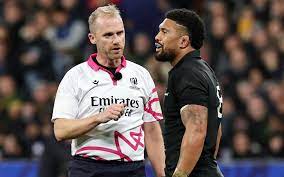Tom Foley, a renowned television match official in the rugby world, has recently withdrawn from his international duties. This move comes in the wake of severe online harassment following his involvement in the tense Rugby World Cup final. Foley’s departure highlights the growing concern over cyberbullying faced by sports officials.
The World Cup final, played between New Zealand and South Africa in Paris last October, was filled with controversial calls. Notably, Foley’s decision to recommend a red card for New Zealand’s captain Sam Cane was heavily criticized. This criticism intensified after South Africa’s close 12-11 win, leading to an outpouring of online abuse directed at Foley.
This issue is part of a broader trend, as seen in the case of Wayne Barnes, the match referee who also retired recently. Barnes, like Foley, is English and cited similar reasons for his retirement – constant social media harassment targeting his family. This pattern of abuse extends beyond professional criticism, affecting the personal lives of sports officials.
England’s captain Owen Farrell also recently took a break from test rugby, prioritizing his family’s mental health. His decision mirrors the concerns raised by Foley and Barnes, underlining the mental strain officials and players face.
Foley, who has been in the international rugby scene for seven years and has officiated in 48 matches, including the Six Nations and the recent World Cup, expressed that the persistent scrutiny and pressure, particularly after the World Cup final, were key factors in his decision to step back. The extent of the abuse was alarming, with some harassers threatening his family and reaching out to his children’s school.
England’s Rugby Football Union (RFU) chief executive Bill Sweeney has publicly denounced the abuse. He emphasized the RFU’s commitment to protecting players and officials from such behavior and called for the rugby community to maintain the sport’s core values.
Foley’s withdrawal is a significant loss to rugby, underscoring the often-ignored human aspect of sports officiating.
In an effort to combat online harassment, World Rugby collaborated with Signify Group, a London-based data science firm, before the tournament. This partnership focuses on shielding officials, players, and coaches from cyberbullying and stresses the importance of their well-being, advocating for a zero-tolerance approach to such abuse.
Foley’s exit is a stark reminder of the detrimental effects of online abuse on individuals in the public sphere, especially in the high-pressure world of international sports.


